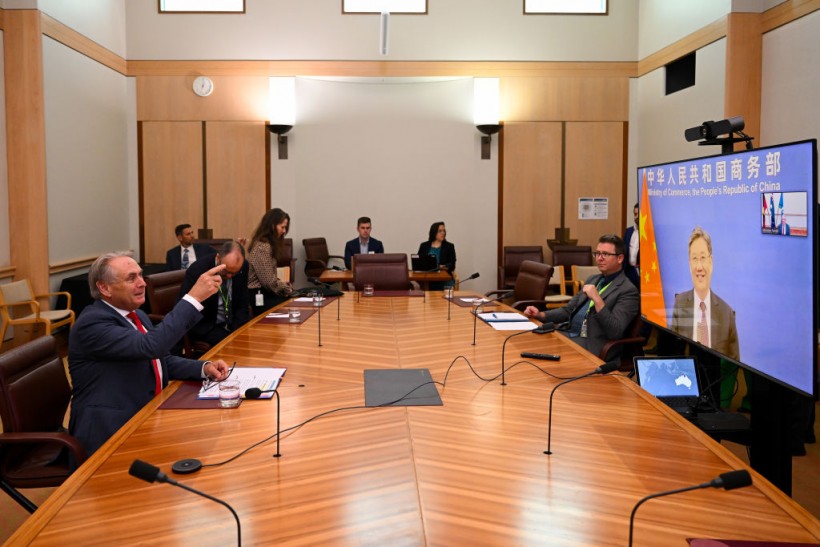
(Photo : Lukas Coch - Pool/Getty Images)
Australia’s Trade Minister visited China to increase bilateral trade and address common concerns.
During a visit to Beijing, Australian Trade and Tourism Minister Don Farrell appears to be making progress in mending a nearly decade-long rift in relations with China.
On Friday, Farrell held meetings and visited businesses, a sign that relations were getting back on track.
China, Australia Trade Ministers Meet
Friday in Sydney, Australian Prime Minister Anthony Albanese stated that the parties needed to "develop understanding and dialogue" and that "we will cooperate with China where we can, disagree where we must, and pursue a national interest."
China will be Australia's largest trading partner in 2022, with bilateral exchanges tallying $287 billion. China has recently resumed imports of Australian lignite, cotton, and copper, and Farrell has stated that he will press for a review of tariffs on Australian barley during his visit, CHRON reported.
China halted these exports in retaliation for actions aimed at Beijing's alleged interference in Australian elections and the political and social life of the large Australian-Chinese community.
While trade relations appear to be strengthening, political and security issues in the Asia-Pacific region continue to divide the parties. Farrell expressed his optimism that his trip would "continue the stabilization of our relationship and pave the way for the successful resolution of all of our outstanding trade differences."
In April, Australian Foreign Minister Penny Wong stated that bilateral relations were unlikely to return to the level of the early 2000s when political and strategic priorities were separated from trade. Since then, Australia has increased its security cooperation with the United States, China's principal rival for influence in the Asia-Pacific.
In response to China's growing military assertiveness in the South China Sea, the South Pacific, and the East China Sea, Beijing has harshly criticized Australia's participation in the so-called AUKUS partnership, which links it with the United States and Britain to create an Australian fleet of eight submarines powered by US nuclear technology.
This is largely in response to Australia's participation in the AUKUS partnership, as per AP News. On May 24, Australian Prime Minister Anthony Albanese will host US President Joe Biden and the leaders of India and Japan, nations with which China has active border disputes.
In recent years, Australia has also prevented the transfer of assets, including essential infrastructure, to Chinese enterprises on national security grounds.
Read Also: Judge Blocks Biden From Using Emergency Parole Powers To Block Migrant Influx as Title 42 Ends
China-Australia Relationship
Farrell stated that he would meet with Chinese Commerce Minister Wang Wentao in accordance with a February agreement to enhance dialogue "at all levels as a means to resuming trade in its entirety."
Per China Daily, given the rapid evolution of the global political and economic landscape, dialogue is both practical and advantageous.
China, as a global manufacturing hub that requires imports of ores and coal, and Australia, as a major exporter of industrial materials, can establish a complementary economic structure, according to Wang Xueling, an expert on regional economic development at Beijing's University of International Business and Economics.
Phillipa Harrison, managing director of Tourism Australia, a government agency responsible for attracting foreign visitors, stated that the agency remains optimistic about the outlook for the industry this year and beyond due to the relaxation of COVID-19 control measures for international travel to and from China.
China was the largest primary market for international visits and expenditures in Australia in 2019. About 1.44 million Chinese residents traveled to Australia, accounting for 15% of all international arrivals. They spent approximately A$12.4 billion ($8.35 billion) in total.
According to data from China's General Administration of Customs, China-Australian trade decreased by 3.9% annually to $220.92 billion in 2022. As a result of improved political and commercial connections, the total value of their bilateral trade in the first quarter of this year increased by 10.9% annually to $58.79 billion.
China is the primary recipient of Australia's exports of iron ore, coal, alumina, copper ore, wool, wine, timber, cereals, fruits, and aquatic and dairy products. China's primary exports to Australia consist of computers, transportation equipment, mechanical and electrical products, electric vehicles, and chemical products.
Related Article: China, France Agree To Develop 'Stronger' Ties, Tackle Global Challenges









